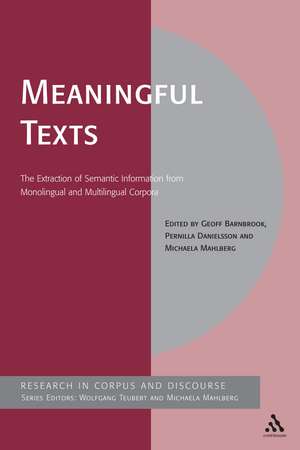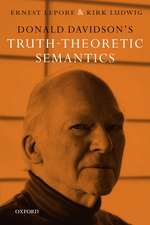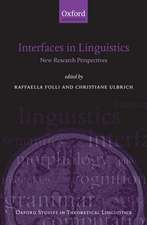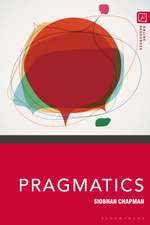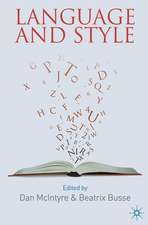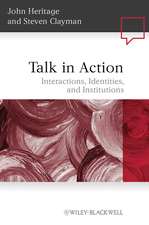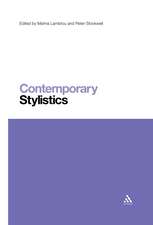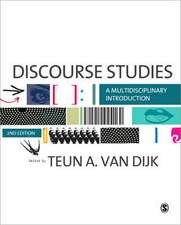Meaningful Texts: The Extraction of Semantic Information from Monolingual and Multilingual Corpora: Corpus and Discourse
Editat de Geoff Barnbrook, Dr Pernilla Danielsson, Professor Michaela Mahlbergen Limba Engleză Paperback – 31 aug 2006
| Toate formatele și edițiile | Preț | Express |
|---|---|---|
| Paperback (1) | 495.61 lei 43-57 zile | |
| Bloomsbury Publishing – 31 aug 2006 | 495.61 lei 43-57 zile | |
| Hardback (1) | 1124.37 lei 43-57 zile | |
| Bloomsbury Publishing – 30 noi 2004 | 1124.37 lei 43-57 zile |
Din seria Corpus and Discourse
-
 Preț: 179.36 lei
Preț: 179.36 lei -
 Preț: 169.35 lei
Preț: 169.35 lei -
 Preț: 168.91 lei
Preț: 168.91 lei - 23%
 Preț: 197.86 lei
Preț: 197.86 lei - 13%
 Preț: 229.59 lei
Preț: 229.59 lei - 13%
 Preț: 257.50 lei
Preț: 257.50 lei - 22%
 Preț: 1064.84 lei
Preț: 1064.84 lei - 23%
 Preț: 199.03 lei
Preț: 199.03 lei - 18%
 Preț: 304.94 lei
Preț: 304.94 lei - 14%
 Preț: 1008.59 lei
Preț: 1008.59 lei - 13%
 Preț: 257.59 lei
Preț: 257.59 lei - 22%
 Preț: 258.24 lei
Preț: 258.24 lei - 22%
 Preț: 224.29 lei
Preț: 224.29 lei - 22%
 Preț: 258.15 lei
Preț: 258.15 lei - 21%
 Preț: 218.91 lei
Preț: 218.91 lei - 30%
 Preț: 570.76 lei
Preț: 570.76 lei - 11%
 Preț: 375.61 lei
Preț: 375.61 lei - 8%
 Preț: 299.86 lei
Preț: 299.86 lei - 19%
 Preț: 344.75 lei
Preț: 344.75 lei - 22%
 Preț: 257.68 lei
Preț: 257.68 lei - 13%
 Preț: 257.97 lei
Preț: 257.97 lei - 22%
 Preț: 258.42 lei
Preț: 258.42 lei - 22%
 Preț: 258.77 lei
Preț: 258.77 lei - 28%
 Preț: 374.34 lei
Preț: 374.34 lei - 14%
 Preț: 570.02 lei
Preț: 570.02 lei - 30%
 Preț: 569.13 lei
Preț: 569.13 lei - 22%
 Preț: 1125.24 lei
Preț: 1125.24 lei - 14%
 Preț: 298.74 lei
Preț: 298.74 lei - 22%
 Preț: 1008.01 lei
Preț: 1008.01 lei
Preț: 495.61 lei
Preț vechi: 612.11 lei
-19% Nou
Puncte Express: 743
Preț estimativ în valută:
94.84€ • 99.27$ • 78.93£
94.84€ • 99.27$ • 78.93£
Carte tipărită la comandă
Livrare economică 31 martie-14 aprilie
Preluare comenzi: 021 569.72.76
Specificații
ISBN-13: 9780826491817
ISBN-10: 0826491812
Pagini: 242
Dimensiuni: 156 x 234 x 18 mm
Greutate: 0.38 kg
Editura: Bloomsbury Publishing
Colecția Continuum
Seria Corpus and Discourse
Locul publicării:London, United Kingdom
ISBN-10: 0826491812
Pagini: 242
Dimensiuni: 156 x 234 x 18 mm
Greutate: 0.38 kg
Editura: Bloomsbury Publishing
Colecția Continuum
Seria Corpus and Discourse
Locul publicării:London, United Kingdom
Caracteristici
Looks at both monolingual and multilingual corpora, and covers a range of languages including English, French, German and Chinese
Cuprins
Part One Monolingual Corpora
1. Extracting concepts from dynamic legislative text collections
Gael Dias, Sara Madeira and Jose Gabriel Pereira Lopes
2. A diachronic genre corpus: problems and findings from the DIALAYMED-Corpus (DIAchronic Multilingual Corpus of LAYman-oriented MEDical Texts)
Eva Martha Eckkrammer
3. Word meaning in dictionaries, corpora and the speaker's mind
Christiane Fellbaum, Lauren Delfs, Susanne Wolff and Martha Palmer
4. Extracting meaning from text
Gregory Grefenstette
5. Translators at work: a case study of electronic tools used by translators in industry
Riitta Jaaskelainen and Anna Mauranen
6. Extracting meteorological contexts from the newspaper corpus of Slovenian
Primoz Jakopin
7. The Hungarian possibility suffix - hat/ het as a dictionary entry
Frenc Kiefer
8. Dictionaries, corpora and word-formation
Simon Krek, Vojko Gorjanc and Marko Stabej
9. Hidden culture: using the British National Corpus with language learners to investigate collocational behaviour, wordplay and culture-specific references
Dominic Stewart
10. Language as an economic factor: the importance of terminology
Wolfgang Teubert
11. Lemmatisation and collocational analysis of Lithuanian nouns
Andrius Utka
12. Challenging the native speaker norm: a corpus driven analysis of scientific usage
Geoffrey Williams
1. Extracting concepts from dynamic legislative text collections
Gael Dias, Sara Madeira and Jose Gabriel Pereira Lopes
2. A diachronic genre corpus: problems and findings from the DIALAYMED-Corpus (DIAchronic Multilingual Corpus of LAYman-oriented MEDical Texts)
Eva Martha Eckkrammer
3. Word meaning in dictionaries, corpora and the speaker's mind
Christiane Fellbaum, Lauren Delfs, Susanne Wolff and Martha Palmer
4. Extracting meaning from text
Gregory Grefenstette
5. Translators at work: a case study of electronic tools used by translators in industry
Riitta Jaaskelainen and Anna Mauranen
6. Extracting meteorological contexts from the newspaper corpus of Slovenian
Primoz Jakopin
7. The Hungarian possibility suffix - hat/ het as a dictionary entry
Frenc Kiefer
8. Dictionaries, corpora and word-formation
Simon Krek, Vojko Gorjanc and Marko Stabej
9. Hidden culture: using the British National Corpus with language learners to investigate collocational behaviour, wordplay and culture-specific references
Dominic Stewart
10. Language as an economic factor: the importance of terminology
Wolfgang Teubert
11. Lemmatisation and collocational analysis of Lithuanian nouns
Andrius Utka
12. Challenging the native speaker norm: a corpus driven analysis of scientific usage
Geoffrey Williams
Part Two: Multilingual Corpora
13. Chinese-English translation database: extracting units of translation from parallel texts
Chang Baobao, Pernilla Danielsson and Wolfgang Teubert
14. Abstract nouns collocations: their nature in a parallel English-Czech corpus
Frantisek Cermak
15. Parallel corpora and translation studies: old questions, new perspectives? Reporting that in Gepcolt. A case study
Dorothy Kenny
16. Structural derivation and meaning extraction: a comparative study of French-Serbo-Croatian parallel texts
Cvetana Krstev and Dusko Vitas
17. Noun collocations from a multilingual perspective
Ruta Marcinkeviciene
18. Studies of English-Latvian legal texts for Machine Translation
Inguna Skadina
19. The applicability of lemmatization in translation equivalents detection
Marko Tadic, Sanja Fulgosi and Kresimir Sojat
20. Cognates: free rides, false friends or stylistic devices? A corpus based comparative study
Spela Vintar and Silvia Hansen
21. Trilingual corpus and its use for the teaching of reading comprehension in French
Xu Xunfeng and Regis Kawecki
13. Chinese-English translation database: extracting units of translation from parallel texts
Chang Baobao, Pernilla Danielsson and Wolfgang Teubert
14. Abstract nouns collocations: their nature in a parallel English-Czech corpus
Frantisek Cermak
15. Parallel corpora and translation studies: old questions, new perspectives? Reporting that in Gepcolt. A case study
Dorothy Kenny
16. Structural derivation and meaning extraction: a comparative study of French-Serbo-Croatian parallel texts
Cvetana Krstev and Dusko Vitas
17. Noun collocations from a multilingual perspective
Ruta Marcinkeviciene
18. Studies of English-Latvian legal texts for Machine Translation
Inguna Skadina
19. The applicability of lemmatization in translation equivalents detection
Marko Tadic, Sanja Fulgosi and Kresimir Sojat
20. Cognates: free rides, false friends or stylistic devices? A corpus based comparative study
Spela Vintar and Silvia Hansen
21. Trilingual corpus and its use for the teaching of reading comprehension in French
Xu Xunfeng and Regis Kawecki
Recenzii
"...the articles are interesting to read and methods introduced are applicable to different phenomena...the book can be recommended for those who are interested in corpus-based linguistics and corpus-based translation studies, especially if their research is concerned with Slavonic or Baltic languages." -- The Linguist List, May 2005
"The 21 chapters that make up this edited collection take the reader across a range of interesting and diverse topics. The use of corpora to explore a variety of issues from machine translation to teaching implications creates a link between the different chapters. An impressive range of languages is represented, including Lithuanian, Czech, Chinese, French, and Hungarian. As the title states, the studies include work with both monolingual and multilingual corpora, and the type of corpora is used as an organizing feature...This work addresses a range of interesting topics through well-written chapters. Readers interested in the breadth of topics and languages that can be addressed through corpus explorations will find this a useful collection." -Randi Reppen, Studies in Second Language Acquisition, December 2008
"The 21 chapters that make up this edited collection take the reader across a range of interesting and diverse topics. The use of corpora to explore a variety of issues from machine translation to teaching implications creates a link between the different chapters. An impressive range of languages is represented, including Lithuanian, Czech, Chinese, French, and Hungarian. As the title states, the studies include work with both monolingual and multilingual corpora, and the type of corpora is used as an organizing feature...This work addresses a range of interesting topics through well-written chapters. Readers interested in the breadth of topics and languages that can be addressed through corpus explorations will find this a useful collection." -Randi Reppen, Studies in Second Language Acquisition, December 2008
